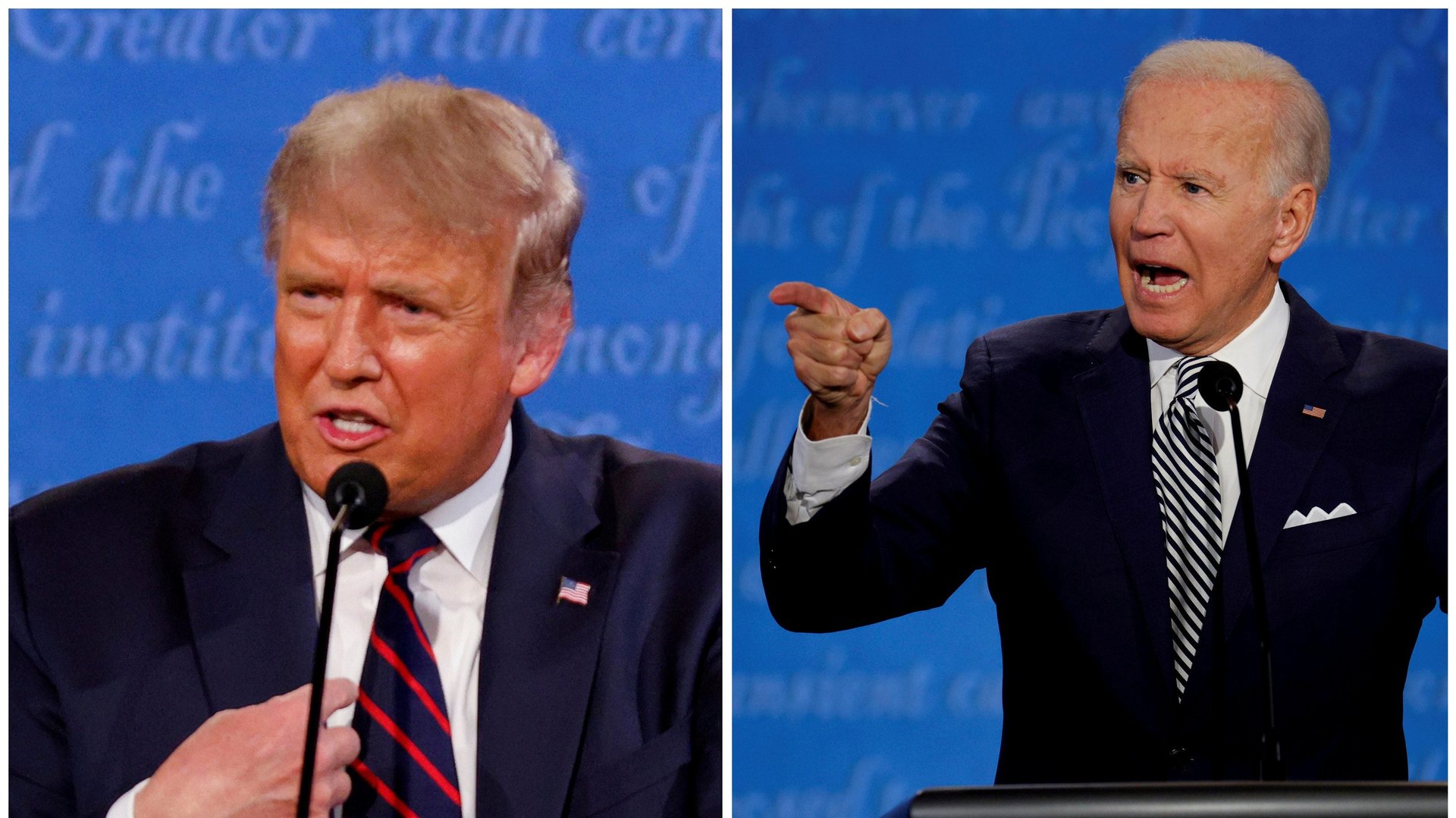What would a virtual presidential debate look like?
The fate of the remaining US presidential debates is in jeopardy after president Donald Trump declared he would not participate in a virtual face-off.


The fate of the remaining US presidential debates is in jeopardy after president Donald Trump declared he would not participate in a virtual face-off.
While Joe Biden’s campaign initially signaled its enthusiasm for the virtual debate, originally scheduled for Oct. 15, both candidates now say they’ll stage separate town halls to take questions from voters. The Trump campaign later asked to postpone the debate and hold it in-person, to give the contagious president more time to recover from Covid-19. His diagnosis was a major reason why the Commission on Presidential Debates announced the new virtual format.
“No, I’m not going to waste my time on a virtual debate,” Trump told Fox Business anchor Maria Bartiromo. “That’s not what debating is all about. You sit behind a computer and do a debate—it’s ridiculous.”
But would a virtual debate really be so bad?
If Biden and Trump did square off via video call, it wouldn’t be the first time two presidential candidates debated remotely. In 1960, Richard Nixon and John F. Kennedy faced each other from studios in Los Angeles and New York, respectively, while moderator Bill Shadel emceed from a third studio in Chicago. That event didn’t play out much differently from previous bouts between Nixon and Kennedy, which were generally even-keeled and focused on policy. The 2020 campaign, however, isn’t cut from the same cloth.
“I think what we saw from [the first presidential debate] shows how virtual events could actually be better,” said Clea Conner, CEO of Intelligence Squared US, a company that usually puts on in-person debates but has had to switch to virtual events due to the pandemic. “Debates are supposed to be structured events. You’re supposed to hear both sides, uninterrupted… We learned that the virtual format gives us a little bit more control.”
John Donvan, the moderator for US Intelligence Squared events, said debaters have a different demeanor on Zoom calls than on a live stage. They’re calmer and quieter. They cut each other off less, and speak with a tone of voice calibrated for conversation, not oration.
While that can make for a more orderly discussion, Donvan said the virtual format can sap a debate of some of its electricity—which could help explain the president’s reluctance to engage remotely.
After all, some of the charge of a presidential debate comes from seeing two opponents finally meet each other face-to-face. The last time Trump and Biden were in the same room together before their last debate was two years earlier, at former president George H.W. Bush’s funeral. On stage at the Cleveland Clinic’s Samson Pavilion, they stood less than 13 feet apart; each could see the other reacting to whatever he was saying out of the corner of his eye.
“There’s something really intense to that. There’s something really powerful about the acoustics that come from the vibration of voices ringing off the walls, and knowing there’s an audience of hundreds of people who are taking them in,” Donvan said. “I’m not sure if you get that when you have three people on a screen in rectangular windows flat against a background.”
A virtual debate also introduces a host of potential technical difficulties. Even the CEOs of the world’s biggest tech companies couldn’t master their A/V setups when they testified virtually before Congress. But that shouldn’t be an insurmountable obstacle for a televised event that brings in more than 70 million viewers.
Conner said Intelligence Squared has solved this problem by taking control out of the debaters’ hands entirely: The company sends them cameras, which it operates from afar. Each camera streams its own video feed, so the debaters’ words are never flattened into the unintelligible mush of crosstalk on a Zoom call. The Commission of Presidential Debates could easily implement a similar solution.
After the first Trump-Biden debate, many observers prayed that future moderators would have the power to mute interrupting candidates. Donvan said that if he were hosting a presidential debate he would insist on having a mute button—even though he doesn’t have one during Intelligence Squared events. Presidential candidates, he explained, are more given to theatrics, and it’s much easier to rein in riled up participants in-person, when he can physically raise a hand or shoot a pointed look.
But while the virtual format would make muting technically very easy, both campaigns would need to sign off on the change for the commission to adopt it. Even if the Trump campaign changes its tune and accepts a virtual debate, it has already signaled its opposition to letting a moderator silence its candidate.